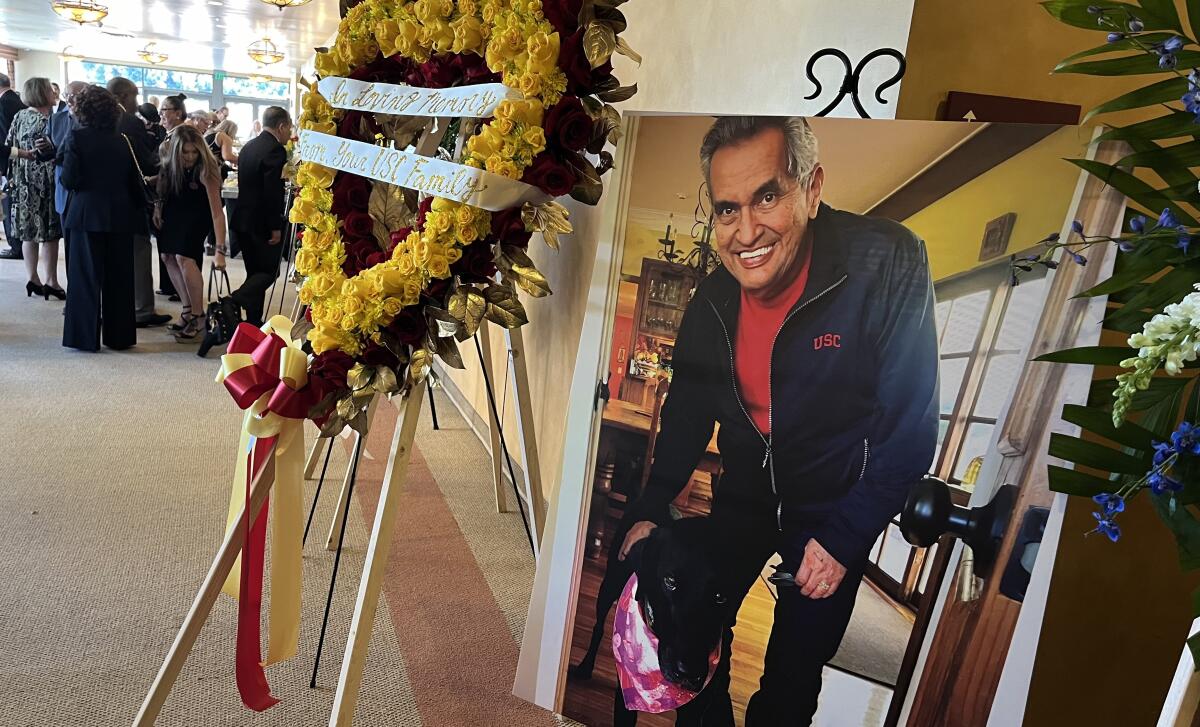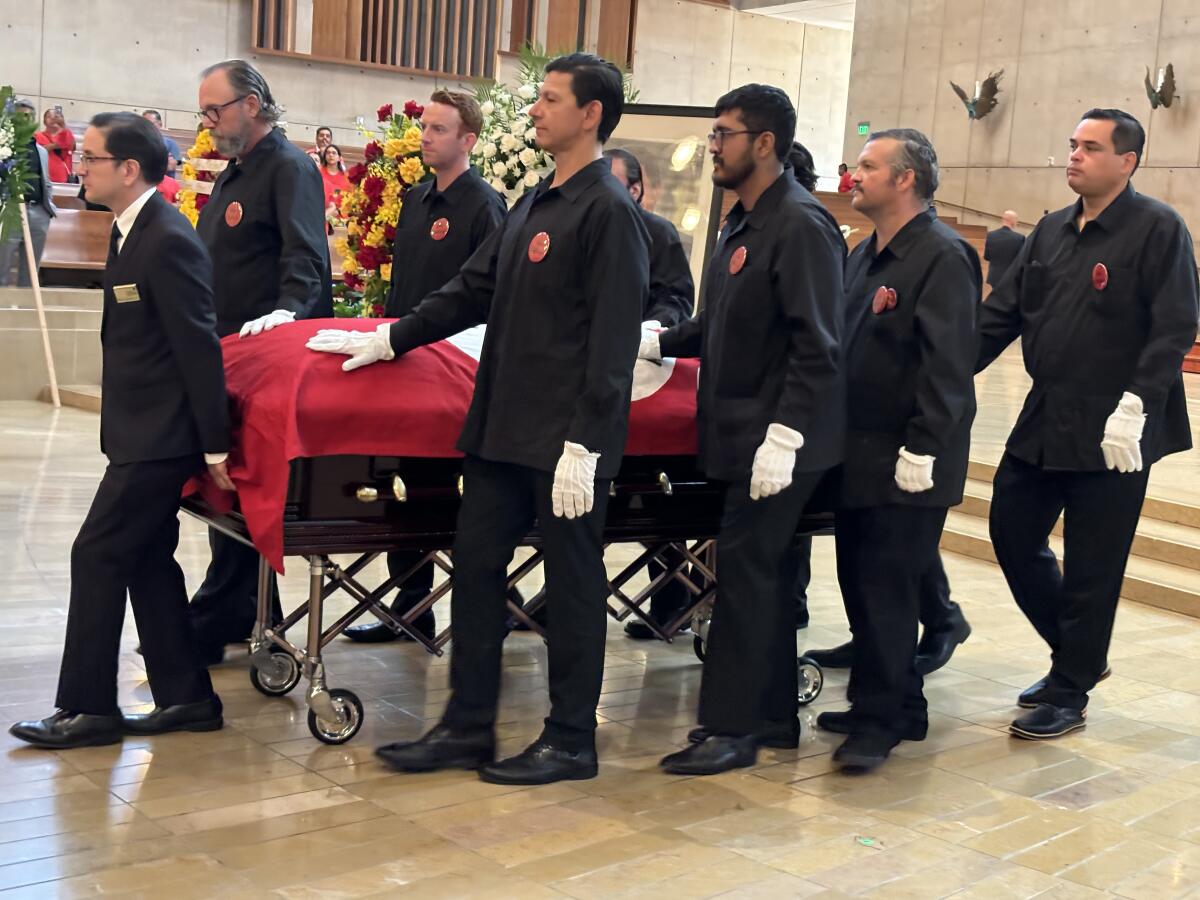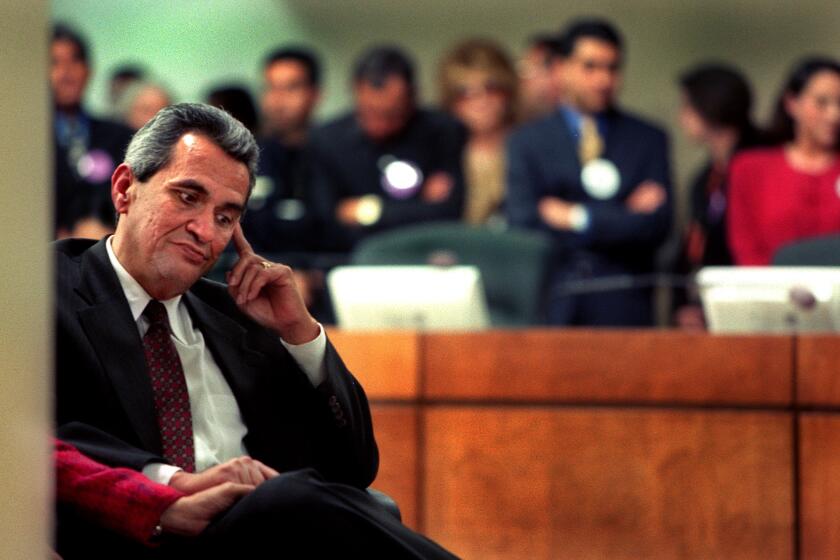Column: From Willie Brown to former students, hundreds mourn political giant Richard Alatorre

- Share via
Even in death, Richard Alatorre looms large over Los Angeles, as I found out this morning on the way to his funeral.
I got off the 101 Freeway at First Street in Boyle Heights, Alatorre’s birthplace, where he built an Eastside political machine that forever changed city and state politics.
Paralleling my path as I headed west toward downtown were the Gold Line tracks, part of a light rail expansion to the Eastside that Alatorre pushed as chair of the MTA board of directors.
Crossing the First Street Bridge, I got a view of City Hall, where Alatorre made history in 1985 as the first Latino councilmember in nearly a quarter century.
Downtown, I caught a glimpse of the Los Angeles Police Department — Alatorre helped diversify its upper ranks through an unlikely allyship with longtime Chief Daryl Gates. Nearby was the former headquarters of this newspaper, which spent years covering allegations of cronyism and backdoor deals against Alatorre.
As I drove up Temple Street, I passed the old federal courthouse, where prosecutors hounded Alatorre at the end of his political career over allegations of corruption, portraying him as a cautionary tale of a politico run amok. In 2001, Alatorre pleaded guilty to not paying taxes on what the prosecutors described as bribes.
Google Maps soon chirped to say I was near my destination: the Cathedral of Our Lady of the Angels, where Richard and his wife, Angie, attended weekly mass for years, and where his final services would be after he died of cancer last month at 81.
Richard Alatorre, who spent his 28-year political career practicing ‘change from the inside’ and bringing other Latinos up with him, has died at 81.
The cavernous holy space soon filled up with people from all eras of Alatorre’s career. Former staffers did one final duty for their old boss by guiding people to their seats.
Titans of Black political power in Los Angeles were there, including Rep. Maxine Waters and former L.A. Councilmember Nate Holden, who witnessed Alatorre engineer the rise of Latino political power without shortchanging L.A.’s Black population.
Cultural leaders included Culture Clash member Richard Montoya, actor Edward James Olmos, former La Opinión publisher Monica Lozano, Mexican Consul General Carlos González Gutiérrez and John Echeveste, longtime head of LA Plaza de Cultura y Artes.

“This is becoming too regular, right?” Echeveste said as he passed through the cathedral’s massive doors. “It’s like that whole generation is leaving us.”
So many mourners showed up that ushers ran out of funeral programs. Instead, people grabbed prayer cards with Alatorre’s photo on one side and his favorite saint, St. Jude Thaddeus, the patron saint of lost causes, on the other.
The line nearly extended out the door as people signed the guest book. L.A. Councilmember Heather Hutt was in front of me. Alatorre protege Richard Polanco, who replaced him in the state Assembly, was behind.
Politicians from D.C. to Sacramento, the Inland Empire to the Bay Area and all parts of Los Angeles packed 11 pews. Longtime Santa Ana Mayor Miguel Pulido recalled the advice that Alatorre once gave him: “‘You can win, you can lose. But you have to fight hard to make a name for yourself.’ And that’s what I did.”
And then there were people like Marc Grossman, who took a civil rights class from Alatorre at UC Irvine in the late 1960s. That inspired him to eventually work for Alatorre in Sacramento and as Cesar Chavez’s longtime speechwriter and assistant.
“Richard and Cesar were much alike in an important respect,” said Grossman, who helped Alatorre write his 2016 autobiography. “They spotted talents, and they could convince people they could do more than they thought. They made it all about other people and what they could do, not what they could gain out of them.”
Richard Alatorre, was imperfect, but his door was always open to the people he represented, and his support for the Chicano movement was profound.
Alatorre was a lifelong Los Angeles Rams fan, and the team’s official mariachi kicked off the service with a stirring rendition of the ranchera classic “La Feria de las Flores,” an Alatorre favorite. Its opening lines perfectly summed up his unapologetic, fiercely proud ways:
Me gusta cantarle al viento
Porque vuelan mis cantares
Y digo lo que yo siento
Por toditos los lugares
I like to sing to the wind, because my lyrics fly. And I say what I feel, anywhere and everywhere.
Officiating over the Mass was retired Cardinal Roger Mahony, in a rare public appearance. The two met in the 1970s when Mahony was a bishop in Fresno and Alatorre was beginning his political career.
Alatorre’s push to bring power to his constituents came from a “deep communion with Jesus,” Mahony stressed in his sermon, pointing out that the lawmaker followed Christ’s example of siding with people on the “peripheries” of society.
On one side of Alatorre’s casket were the flags of the United States, Mexico, the city of Los Angeles and the United Farm Workers. On the other side were funeral wreaths in cardinal and gold, to honor his beloved alma mater, USC, and a large photo of Alatorre with his arms crossed, a slight, confident smile on his face.
“Richard understood,” the cardinal continued, “that change took place with people who had the will and willingness to pursue that path forward.”
George Pla, president of the Coliseum Commission and part of a group of that regularly had breakfast with Alatorre at La Carreta in East Los Angeles, said in a short eulogy, only half jokingly: “There are mocosos [snot-nosed brats] in the state who don’t even know how they were elected,” when Alatorre had paved the way for them.
Alatorre’s daughter, Melinda, praised him as a “great granddad and dog dad.” His son Darrell boasted that his dad was “a Mexican, not a Mexican’t. A lot of Latino politicians should take note.”
Luisa Acosta, Alatorre’s City Council chief of staff, once told her boss that she was going to accept a job as a television news anchor.
“He said, ‘Why do you want to be on camera reading the news when you could have a hand in shaping our community?’” Acosta recalled. “Richard didn’t just see our potential. He nurtured it. ... Rest in peace, jefe.”
Concluding the eulogies was Willie Brown, former San Francisco mayor and longtime speaker of the California Assembly who came of age politically with Alatorre in Sacramento during the 1970s. Brown picked his friend to lead redistricting in 1981, which forever changed the look of the state Legislature.
“It all started with Richard Alatorre and nobody else,” Brown said to loud applause. He went on to extol Alatorre for the foresight to draw lines anticipating that Californians’ demographics would dramatically shift in the coming decades “when none of us would be around.”
LOU KORANSKY needed help in the credit department of his busy jewelry store on Whittier Boulevard.
“When you say a prayer today,” Brown quipped, “you better ask Richard if there’s any room where he is. Otherwise, you ain’t gonna get in heaven.”
Alatorre’s honorary pallbearers draped a United Farm Workers flag over his coffin, and Mariachi Los Rams led the procession out of the cathedral, singing “De Colores.” Mourners walked across the cathedral plaza and were greeted by the USC Trojan Marching Band before heading to a large second-floor reception hall.
Postcards, to be filled out with mourners’ favorite Alatorre memory, were stacked next to a condolence letter from Vice President Kamala Harris. People snacked on chips and pan dulce and admired photo collages from Alatorre’s life and career pasted onto poster boards that also featured favorite Alatorre sayings: “Let me begin by beginning ...” “Órale.” “Chula.”
Maria D. Acosta and Cynthia Amador Diaz both wore “Viva Alatorre!” pins. Acosta, former district director for the U.S. Department of Commerce in Los Angeles, said Alatorre helped her get into Catholic University in the late 1960s and then land a job right out of college.
“We knew him in the [Eastside] as someone who was always trying to help,” said Acosta, who lives in Pasadena. Diaz agreed, remembering how when he was on the City Council, he helped a nonprofit she worked for.
“He would pick up the phone and call someone in the city and say, ‘Hey, these people need help,’ and things would get done,” the Monrovia resident said.
“He was a mentor to all,” Acosta added.
Nearby, Andrés Chavez, a grandson of Cesar Chavez and executive director of the National Chavez Center, greeted well-wishers. He mentioned his grandfather’s famous speech predicting that Latinos would one day be a political and economic powerhouse in California.
“My tata talked about that, but Richard made it happen,” Chavez said. He then shared with me a voicemail from Alatorre, expressing pride in Chavez and his career. The call ended with Alatorre saying, “I love you, brother.”
“You saw all the people inside the cathedral that he mentored. And I am now the next generation,” Chavez said. “We have the obligation to Richard to help, just like he did.”
More to Read
Sign up for Essential California
The most important California stories and recommendations in your inbox every morning.
You may occasionally receive promotional content from the Los Angeles Times.













